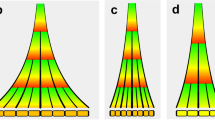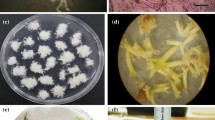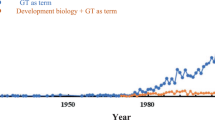Abstract
Robbins1 and Wareing2 have suggested that chemical or cellular differences are the basis of the striking dimorphism of the juvenile and adult growth phases of some plants. The following experiments support this view and show that differences can persist through repeated sub-cultures of tissues in vitro.
This is a preview of subscription content, access via your institution
Access options
Subscribe to this journal
Receive 51 print issues and online access
$199.00 per year
only $3.90 per issue
Buy this article
- Purchase on Springer Link
- Instant access to full article PDF
Prices may be subject to local taxes which are calculated during checkout
Similar content being viewed by others
References
Robbins, W. R., Amer. J. Bot., 46, 485 (1960).
Wareing, P. F., J. Linn. Soc. Lond., 56, 282 (1959).
Stoutemyer, V. T., and Britt, O. K., Nature, 189, 854 (1961).
White, P. R., Handbook of Plant Tissue Culture (1943).
Shantz, E. M., and Steward, F. C., Ann. Bot., N.S., 23, 371 (1959).
Privat, Guy, Naturalia Monspeliensia, Ser. Bot., 10, 91 (1958).
Author information
Authors and Affiliations
Rights and permissions
About this article
Cite this article
STOUTEMYER, V., BRITT, O. Tissue Cultures of Juvenile and Adult Specimens of Ivy. Nature 199, 397–398 (1963). https://doi.org/10.1038/199397a0
Issue Date:
DOI: https://doi.org/10.1038/199397a0
This article is cited by
-
High frequency direct plant regeneration from leaf, internode, and root segments of Eastern Cottonwood (Populus deltoides)
Plant Biotechnology Reports (2009)
-
In vitro shoot proliferation of 5-leaf aralia explants from field grown plants and forced dormant stems
Plant Cell, Tissue and Organ Culture (1997)
-
Disc Electrophoresis of Proteins from Juvenile and Adult Specimens of Ivy
Nature (1966)
-
Organ formation in vitro as applicable to forest tree propagation
The Botanical Review (1965)
-
Recent experimental studies of the shoot apex and shoot morphogenesis
The Botanical Review (1965)
Comments
By submitting a comment you agree to abide by our Terms and Community Guidelines. If you find something abusive or that does not comply with our terms or guidelines please flag it as inappropriate.



